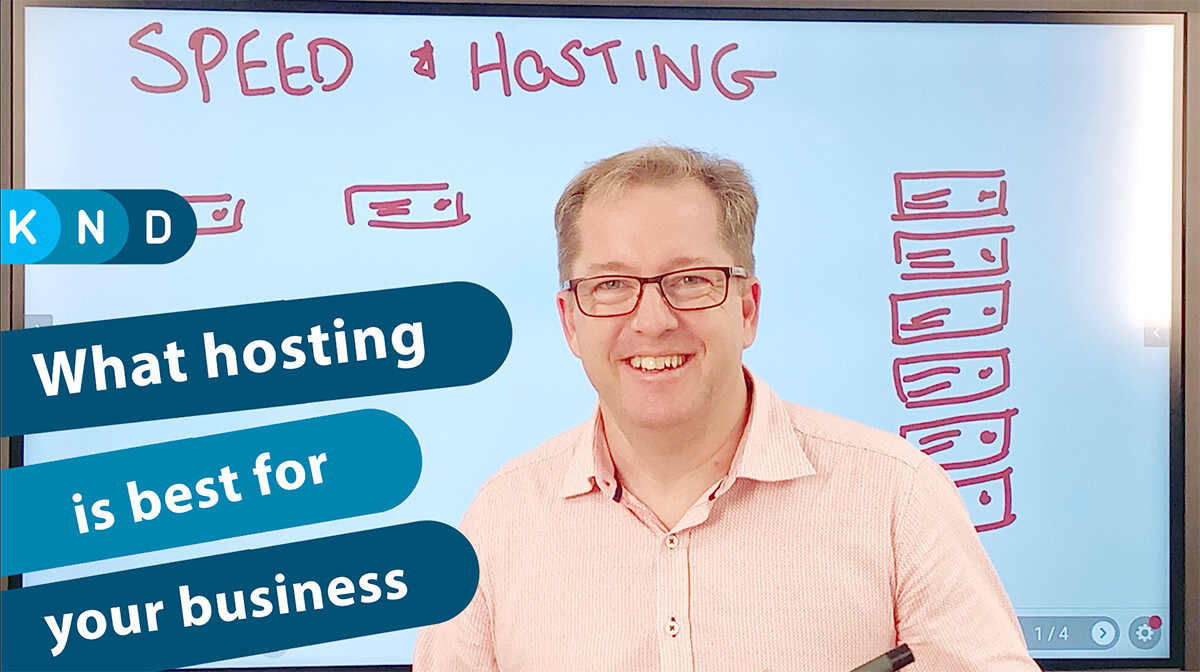
The speed of your website is such a hot topic these days. Google has made it a ranking factor in SEO, or so they say and and certainly for ads you get a quality score of your page for how fast it can load. So how much of your hosting contributes to site speed? Sure, I’ve talked a lot about your site speed in relation to your install of various software and what makes that fast, but let’s look at some hosting options. Everyone goes… arhh you need this type of hosting and this type of hosting but for various business in various sizes it makes a whole lot of difference as to how to approach. And we take the approach of start small and grow with your audience.
So keeping a very close eye on your audience and your numbers each month, you’ll get an idea of the type of hosting you need. There are some very very large businesses that have a regular flow of traffic that don’t need really high-end hosting. But there’s others that absolutely do need high-end hosting and here’s why. So let’s just take a quick look here is a web server sitting somewhere out in a server farm somewhere and it has your your website on it.
Now in most cases if you’re in a very basic environment paying a basic per month fee you might even not even be paying a fee, you know five bucks a month or whatever that is, you’re in a shared environment! So what a shared mean? Well it means there’s possibly hundreds, if not thousands of web sites all sitting on the one server. So what that means is when you are when you’re sending traffic out to and getting lots of traffic to your website, then this influences the other websites on there as well.
So if one of these other websites gets the lots of traffic there’s an influencing factor that slows the whole ecosystem down. It is not great for growth, not great for business.
So what are the next variations? I’m going to call this “private shared” if you like.
So similar to similar to this model but on a much smaller scale, so you actually know how many other sites are kind of on your server or on your resellers server or on your web developer has is serving maybe 50 sites on here it has a lot more control over this sort of behavior. So this sort of behavior doesn’t necessarily happen on it can, but to a much lesser extent. So that’s private shared!
The next step up is to go to fully dedicated so what is dedicated you actually are the only website that sits on that web server box that little computer in the rack you are the only site on that server. Now that is fantastic! You get a lot of control but what happens when it starts to ring off the hook even more. The pluses and minuses of this is you need to look after it so how has it managed and I you are you going to self-manage so there’s various bonuses to that.
Whether it’s managed by someone you’re obviously paying them a fee per month to keep everything up to date and keep your security model in place, or, they just hand you the box and new control it. that’s a can be quite a high-risk maneuver it can be cheaper but higher risk.
So there’s dedicated, now there’s a lot of chatter about cloud. So what is what is cloud hosting so the variations of you know Azure and Amazon so how this works is you have a little spot on a cluster of computers so this just runs along and if you get a lot of traffic then your server can start using the resources of this server. then it can start if it rings off the hook again, it can start using the resources and so forth they call this elastic.. elasticity of your site so it can expand use those resources when it needs to and then contract down. Very good, but you’ve got to manage it and like this you’ve got to either self manage it or pay someone to manage it. So all in good in theory and everyone can say hey you need this, but do you actually really need it.
And this is something to think about. To give you a description about why you need particular hosting is this. So imagine your website is behind a door, the door is the hosting facility if you like – the big factory where all these servers are all stacked up. And you’ve got these people lined up to come to your site during the day.
Now in a normal circumstance, this first person would come along to your site and ask for information and your site goes back and starts to process that information of passes the information back. Happy days, happy client! The next person turns up and does exactly the same thing the next person the next person the next person.
In that general flow of things that is very very standard behavior. You don’t need a very heavy load server for this sort of behavior and this is why a lot of sites do not need dedicated servers or cloud servers because this is very standard behavior. However when you start to go and look at this scenario… of everyone coming to the door at once and asking this person is asking this person is asking everyone’s asking all the time this server has to go down and do some stuff over here and then feed it back to the crowd and then so you can see the guy at red back here he’s not going to get that information that’s actually failed because the server hasn’t been able to keep up. So what happens is we need to start adding more resources to this type of scenario and this is where the elasticity of the cloud comes in play.
So basically if you’ve got more servers down here, then if you are your little website saying here it can start to use these resources to respond more quickly. So you can see if you’ve got a lot of users all coming at the same time to your site then you’ll need cloud to be that elastic resource control. If you have only a few but they need to do a lot of stuff process a lot of information interact with a very large catalog that uses a lot of resources. Then you used has to have the same sort of scenario, many more resources to serve.
So this is how you work out whether you need either cloud or shared or private or dedicated is that sort of resource usage. So you also calculate your hosting on support are they going to pick up the phone everyone just sort of sits there hosting in the background without even thinking about it. But only when it turns to poo do you go ah man I need to talk to my server, so if you’re paying a very cheap price for your hosting perhaps that support is only via chat or not even chat at all only via email and the takes three days for them to do anything so this is where support is very important. Security is highly important , location perhaps is it in Australia or the US or know how does that work. And the management of that is it fully self managed by yourself or fully managed by the facility itself. So there’s a lots of different options and it’s how you prioritize that for your for your particular business.
If you’re an e-commerce you’re going to need something a little bit more solid. If you’re high-traffic, learning platform perhaps that has a lot of people, then you’re also going to need that bigger resource. So you can see the variations that dictate how much you know your servers are willing to respond.
If you think your site is running a little bit slow it’s actually running really slow and not actually serving your customers evening a nice user experience then it’s time to think about your hosting.




